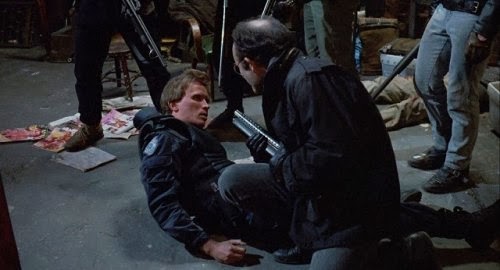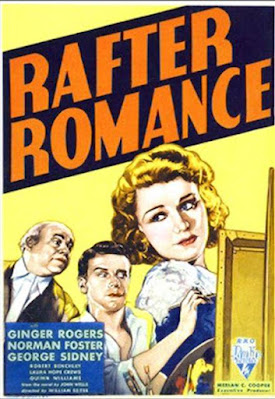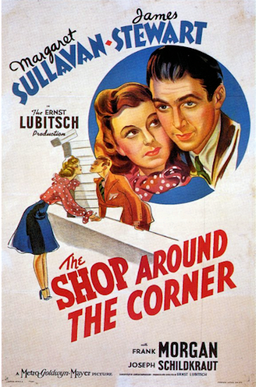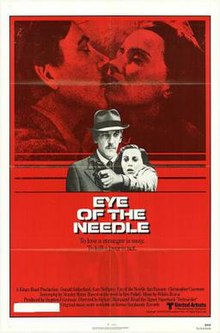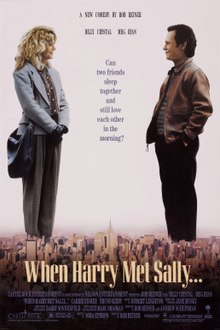Ferry
Cross the Mersey (1965) Starring: Gerry and the Pacemakers (Gerry Marsden,
Freddie Marsden, Les Maguire, Les Chadwick), Cilla Black, Julie Samuel, The
Fourmost, Jimmy Savile. Directed by Jeremy Summers. Screenplay by David Franden. Story by Tony Warren. Produced by Michael Holden and Brian Epstein
(Executive Producer). Run time 88 minutes. UK. Black and White. Comedy, Drama,
Musical
Gerry and the Pacemakers were the seconds in
almost everything related to Merseyside and music; the second group to be
signed by manager Brian Epstein, the second Mersey group to be signed by a
major label and the second Liverpool group to be have a number one hit in the
UK*. Not bad to be number two, but
when the number one you’re chasing is the best-selling group of all time, The
Beatles, the gap is quite significant.
It is no surprise that Gerry and the Pacemakers would also make a movie, too. Following the success of The Beatles’ A Hard Day’s Night (1964), why wouldn’t Brian Epstein try to make magic a second time by highlighting his second biggest act? The problem is that lightning doesn’t strike twice very often.
The band was formed in 1959, with Gerry
Marsden on guitar, his brother Fred on drums, Les Chadwick on bass and Arthur
McMahon on piano; Les Maguire replaced McMahon in 1961. For a time, they were
called Gerry Marsden and the Mars Bars, before the Mars candy company forced
them to change it. Like The Beatles, the Pacemakers played the club scene in
Liverpool, including the famous Cavern Club, and made virtually the same trip
to Hamburg, Germany to work in the clubs there.
 |
| Gerry and The Pacemakers. |
Signed in 1963 to Columbia Records, a sister label to Parlophone, The Beatles’ label. Produced by George Martin, their first three singles: How Do You Do it?; I Like It and You’ll Never Walk Alone all went number one in the U.K. (A feat that would not be matched until Frankie Goes to Hollywood did it in the 1980’s.) However, they would never have a number one hit in the U.K. again and never did have one in the U.S. for that matter. These singles had been covers, the first two written by Mitch Murray and the third from Rodgers and Hammerstein’s musical, Carousel. Gerry started to write their songs, which included It’s Gonna Be Alright; I’m The One; Ferry Cross the Mersey and their biggest U.S. hit, Don’t Let the Sun Catch You Crying, which peaked at number four in the Billboard charts.
 |
| The first of three consecutive number ones for Gerry and the Pacemakers in the UK. |
By late 1965, the group’s popularity was already in decline. The group called it quits in October 1966, about the same time their version of Simon and Garfunkel’s The Big Bright Green Pleasure Machine, failed to chart.
Like A Hard Day’s Night, Ferry Cross the
Mersey tells a fictional version of the Pacemakers story. Beginning with a wild
airport reception greeting the Pacemakers back from a successful U.S. tour.
With It’s Gonna Be Alright playing,
they group goes to the studio where producer George Martin is shown recording
the song.
Reflecting back on their success, Gerry
narrates a flashback telling how the group formed which ends with the group
playing a concert at the Cavern Club in their native Liverpool. We hear them
singing Slow Down, the same Larry Williams song the Beatles would also cover
that same year on their Long Tall Sally EP in the UK. The Pacemakers version's
not bad either.
Gerry is a happy go lucky art student living
across the Mersey River from Liverpool with his Aunt Lil (Mona Washbourne) who
has taken Gerry in after his mother died. With them live two boarders, Mr.
Lumsden (George A. Cooper), an undertaker, and Miss Kneave (Patricia Lawrence),
a librarian. Having been up late last night playing his music, Gerry has
trouble getting up in the morning. But when push comes to shove, and in sped up
pace, Gerry gets dressed and washes up before going to a breakfast of porridge.
Getting on his motor scooter with his guitar
and art portfolio, Gerry heads down to the docks and rides onto the Ferry just
as it’s pulling away. On board are the rest of the band, Fred (Freddie
Marsden), Les (Les Chadwick) and Les (Les Maguire), who are also art students.
While on board, they start to sing the title song, Ferry Cross the Mersey.
 |
| Singing Ferry Cross the Mersey on the ferry crossing the Mersey. |
Once they’re done singing, they ride off straight to art school. Dodie Dawson (Julie Samuel), Gerry’s wealthy girlfriend, is also a student there as well. All the students hurry to their life drawing class under the instruction of Trasler (Deryck Guyler). [You might recognize Guyler from A Hard Day’s Night as the Police Inspector who had to deal with both Ringo and Paul’s Grandfather.] Once everyone is set up, Trasler leaves, which means a party breaks out. Gerry, prompted by Dodie’s asking him how he feels about her, sings her a song, Fall in Love, to explain his feelings. Trasler returns and everyone, including the nude model, Norah (Margaret Nolan) [Another bit player from a Hard Day's Night.], try to act like they’ve been working all the time.
 |
| Familiar face #1. Deryck Guyler as he appeared in A Hard Day's Night (l) also appeared in Ferry Cross the Mersey as Art Instructor Tasler (r). |
 |
| Familiar face #2. Margaret Nolan was Grandfather's girlfriend at the Circle Club in A Hard Day's Night (l) is the nude life art model, Norah, for Tasler's art class (r). |
For lunch, Gerry and group drive to a nearby Chinese restaurant. Even though they come close to insulting their waitress (Dorothy Su), they break into song, This Thing Called Love, and amuse the other patrons to the point where the manager (Andy Ho) gives them their meal on the house.
Dodie wants to help her boyfriend’s band and
to that end goes to see Jack Hanson (T.P. McKenna), a local promoter. She
convinces him to give Gerry and the Pacemakers a listen. He agrees to give them a chance and attends one of their rehearsals at a local plumbing factory where
some of them work. The band plays Think
About Love. When girls outside
hear them singing, they come screaming into the building. Hanson is impressed
and offers to represent the band on the spot. They are signed up to perform at
a local contest to pick the British representative for a Euro-beat contest. But
they have to figure out which song to play.
 |
| Dodie Dawson (Julie Samuel), Gerry's wealthy girlfriend, wants to help the Pacemakers and sees an agent on their behalf. |
In the meantime, Gerry meets Dodie’s father, Col. Dawson (Eric Barker), after Gerry sings another song to Dodie, I'll Wait For You. The Colonel is impressed that Gerry is so well read on art and can talk intelligently on the topic. Having won the Colonel's approval, Gerry and the Pacemakers let their new manager take them to buy new instruments for the contest. Trying out the new equipment is a good excuse for another song, Baby You're So Good To Me.
 |
| The Pacemakers try out new instruments with the song Baby You're So Good to me. |
Using Mr. Lumsden’s hearse, which they promise not to drive over 20 mph, the group transports their new gear to the contest, which Aunt Lil, Lumsden and Miss Kneave also attend. The group puts down their equipment and goes to watch their competition. The contest is being Emceed by Jimmy Savile, then the popular and flamboyant host of BBC TV’s Top of the Pop series. (After his death in 2011, allegations of sexual and child abuse would ruin Savile’s reputation.)
The contest is a showcase for more of the
Epstein music stable, each performing what they hoped would become a well-known
song The Fourmost: I Love You Too; The Black Knights: I Got a Woman; The Blackwells: Why Don't You Love Me?; and Earl Royce & the Olympics: Shake a Tail Feather!
While they’re watching the other groups play,
the Pacemakers' gear is inexplicably picked up and taken to the airport. Gerry,
Dodie and group take the hearse and try to intercept the van with their
equipment. The chase is sped up for comedic effect in an attempt to recreate a Keystone
slapstick short, right down to the Liverpool version of the Keystone Cops. The
group seems to be having more fun than we are watching them.
Since Gerry is not available, Hanson
convinces Cilla Black (playing herself) who is supposed to close the show, to go on until they
get back. Cilla sings something less than a signature song: Is it Love?, but of course everyone
loves it.
Having retrieved their gear, Gerry and the
Pacemakers return to the contest and play
It’s Gonna Be Alright and, of course, win. We’re supposed to believe that
they become famous because of winning the contest, which we know isn’t true. On
the ferry ride back across the Mersey, the group celebrates their victory with
family and friends and we hear Ferry
Cross the Mersey play one more time.
To call this a poor man’s A Hard Day’s Night,
would be doing that film an injustice. A Hard Day’s Night is one of my favorite
movies of all time and presents an idealized version of a day in the life of
The Beatles using a documentary filmmaking style. Ferry Cross the Mersey tries
the same approach, even using the same Director of Photography, Gilbert Taylor.
But that’s where similarities stop. A Hard Day’s Night was a glimpse of a group
which was still on the rise. By the time Ferry Cross the Mersey came out, Gerry
and the Pacemakers' best days were already behind them; just no one knew it yet.
Ferry Cross the Mersey concentrates on Gerry,
the obvious leader, rather than taking an ensemble approach. The pace is
surprisingly slow, the humor well-worn and much of the dialogue is
indiscernible. While I have obviously heard Liverpudlian spoken before, I found
that much of the speaking in this film is obfuscated by everyone’s thick scouse
accents. The songs are very hit and miss as well. If they’re good, they’re
memorable: Ferry Cross the Mersey and
It’s Gonna Be Alright, when they’re
not, they’re very forgettable: This Thing Called Love; and
Why Oh Why.
 |
| The soundtrack showing the Pacemakers playing the Cavern Club. |
Besides the sped up footage and the jokes drowned in scouse, comic relief is provided by a basset hound which Gerry befriends on the ferry on the way to art college. The basset hound continues to show up: on the steps of the school, under the table at the Chinese restaurant, chasing after the boys down the sidewalk, etc. At the end of the movie, it is in fact the basset hound that’s shown to be steering the boat. (Insert laugh here.)
Ferry Cross the Mersey is not a second coming
of A Hard Day’s Night. Instead, it is a somewhat interesting novelty from the
British musical invasion. An exploitation film trying to hit while the iron of
the British Invasion was still hot, the film misses the mark. By the time of
its release the Ferry had already sailed on Gerry and the Pacemakers. This is
only for the hardcore amongst us, if you can even find it to watch. Otherwise,
this is not a film for you, even in your most nostalgic of moods.
*Okay, officially
Gerry and The Pacemakers’ How Do You Do
It? (released March 1963) was a number one hit before the Beatles’ third
single, From Me to You (April 1963)
charted that high. However, Please Please
Me (January 1963) was number one on the New Musical Express chart (the most
recognized chart at the time) as well as Melody Maker’s, but failed to
replicate that success on the Record Retailer chart, which was the official UK
Singles chart, peaking at number two. In some circles, Please Please Me is considered to be the Beatles' first number one
and it was out two months before How Do
You Do It?





